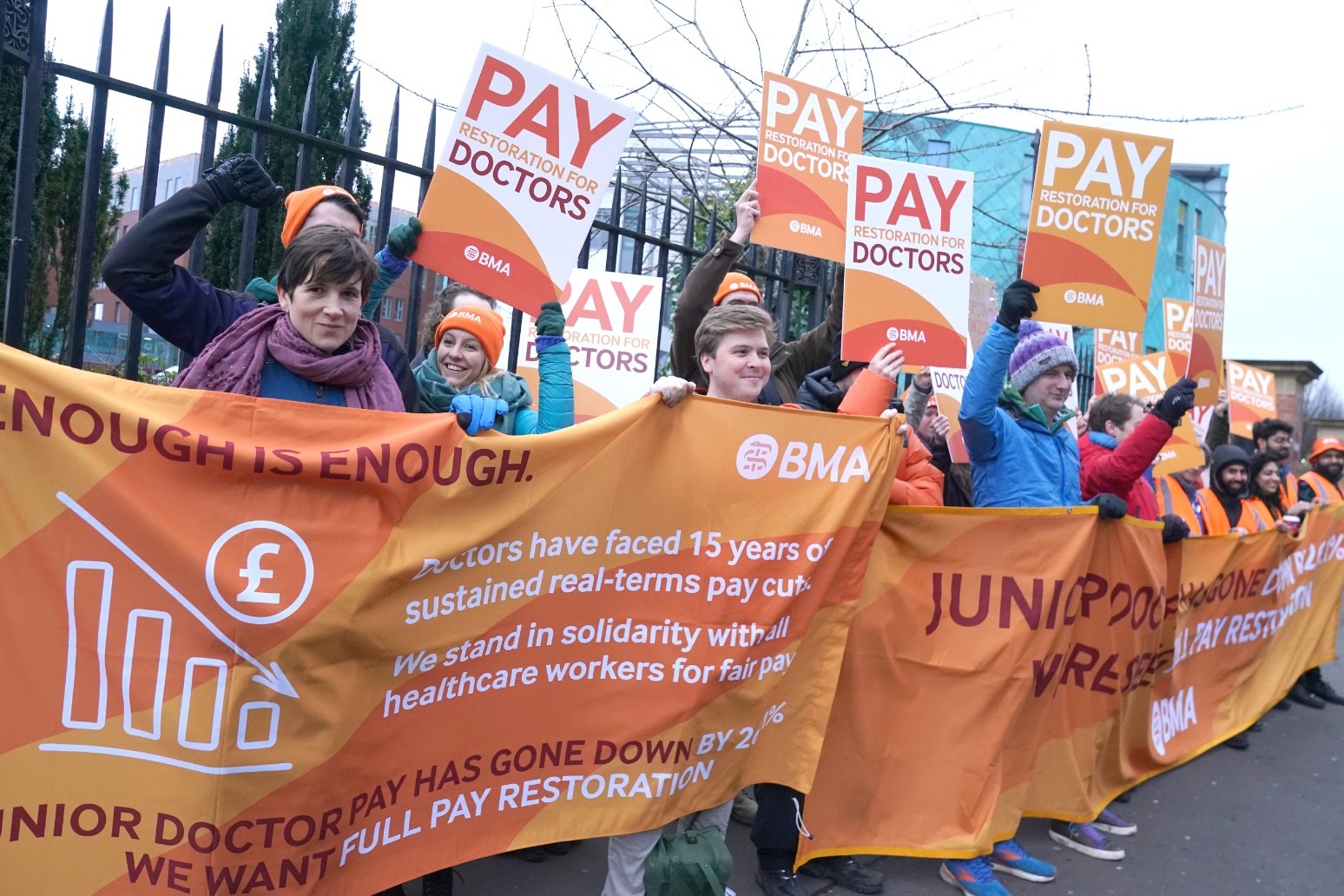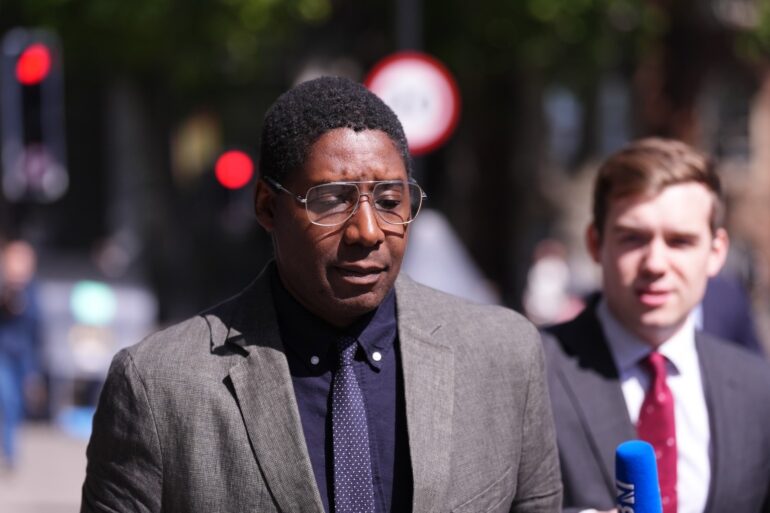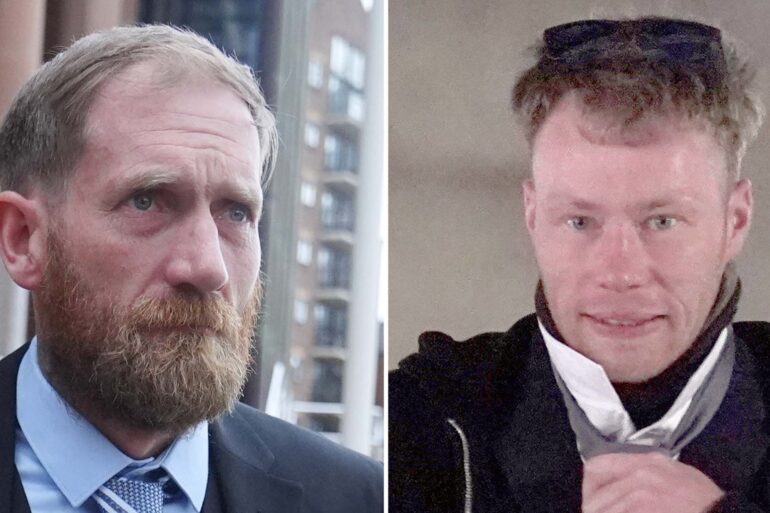-
 play_arrow
play_arrow
Kl 1 Radio Local radio for west Norfolk
-
 play_arrow
play_arrow
KL DISCO KL Disco Playing Disco Music from the 70's onwards.24/7
-
 play_arrow
play_arrow
KL COUNTRY KL COUNTRY Playing New and Classic Country Music 24/7
-
 play_arrow
play_arrow
KL ROX KL ROX The best of New and Classic Rock.24/7
-
 play_arrow
play_arrow
KL SUMMER Summer Vibes 24/7 from KL1 Radio across West Norfolk
-
 play_arrow
play_arrow
KL CLASSICAL Your Symphony Starts Here
-
 play_arrow
play_arrow
KL CHILL Just Chill!
-
 play_arrow
play_arrow
KL POP The Best POP Hits all day Long!
-
 play_arrow
play_arrow
KL XTRA KL XTRA
music_note

Patients have been warned that there will be “significant disruption” to NHS services as junior doctors in England have gone out on strike during one of the busiest periods of the year.
Doctors in training – which make up around half of the medical workforce in the NHS – began their 72-hour strike at 7am on December 20.
NHS leaders have expressed “disappointment” that talks between the British Medical Association (BMA) and the Government broke down and said that the fresh round of industrial action has come at the “worst possible time” for the health service.
Doctors’ leaders have said that the Government “walked away from talks” after strikes were called, insisting that there is no law or rule which prohibits negotiations from continuing once a walkout has been called.
The BMA’s junior doctors committee challenged the Government to make an offer so strikes could be “cancelled today”.
Conciliation service Acas said it is “ready to help” resolve the dispute.
Acas chief executive Susan Clews said: “We have a team of experts who are well prepared and ready to help with the junior doctors dispute.”
It comes as:
– Cheltenham A&E has been forced to temporarily close at various points in the coming weeks due to strikes.
– Leading health and patient organisations warned that the strikes could lead to patients “stranded” in hospital over Christmas, despite being ready to go home.
– The NHS has said emergency and urgent care will be prioritised during the strikes and that “almost all” routine care will be affected.
– Junior doctor members of the Hospital Consultants and Specialists Association in England are also on strike for 72 hours.
– On Tuesday, Prime Minister Rishi Sunak described the strikes as “very disappointing”, saying junior doctors are the “only remaining people who have not settled” their pay dispute.
– Work and Pensions Secretary Mel Stride told Times Radio that junior doctors were making “unrealistic” pay demands.
– Junior doctors are also preparing for the NHS’ longest ever walkout, for six whole days from January 3.
Professor Sir Stephen Powis, national medical director for the NHS in England, told the PA news agency: “This is coming at the worst possible time of year for us where we are beginning to see those winter pressures that we always see around the festive season, with flu cases and Covid cases on the rise.
“So there is no doubt this is going to be a challenging period and we will see disruption once again.”
Asked whether the temporary closure of Cheltenham A&E could be repeated in other parts of the country, he told PA: “That is an exceptional case and it mirrors what has happened in previous strike days.
“There are local variations in place to manage the strike days but our aim is to ensure that emergency services are there for patients when they need them.
“We want to keep patients safe, the BMA also stated they wish to keep patients safe, and we will be ensuring that we have a laser focus on ensuring our most urgent and emergency pathways are there.”
He added: “This will be a disruptive period – three days this week, six days – the longest period of strike action that we’ve seen – early in the new year.
“Of course that’s after the new year festivities where we see activity growing, so it’s that second period of strike action in January that is giving us the most concern.”
Sir Stephen said that he was “disappointed that negotiations broke down” but said that deals reached with other doctor groups show that it is “possible to make progress”.
Health Secretary Victoria Atkins urged the BMA to call off the strikes and resume talks.
“We know that despite these measures and the hard work of NHS staff, these strikes can cause significant disruption to patients and add extra pressure on the NHS,” she said.
“My door remains open should the BMA junior doctors committee cancel these disruptive strikes and come back to the negotiating table as we were making good progress.”
Dr Vivek Trivedi, co-chairman of the BMA junior doctors committee, told the PA news agency that in order to break the deadlock the Government needed to “recognise and value doctors and not inflict a real-terms pay cut”.
Last week, Ms Atkins said that a final offer had not been put before the BMA before more strikes were announced.
Asked about Ms Atkins’ remarks, Dr Trivedi told PA: “We have still not seen this further offer. So if it really is enough to stop strikes, then let’s have it. If it is credible we can put it to our members and we can cancel these strikes today.”
He added: “We have never walked away from talks, we have called strike action and then the Government has walked away from talks, but we’re ready to speak at any point.
“There is no law, there is no rule that stops people talking when strikes are called and in fact we saw a completely different approach in Scotland where our colleagues had called for strike action but their government met them at the table and they negotiated a deal which ultimately, not only was good enough to put to members but was good enough to be agreed by members, and they were able to avert strike action, full stop. I only wish that our Government would take some notice of that.”
But Mr Stride told LBC Radio: “They’ve walked away, we have our door wide open to continue these discussions. We’ve been making some progress, but they really should be coming back to the table now. It’s deeply disappointing that they’ve done what they’ve done.”
The BMA announced the strike earlier this month after talks between junior doctors and the Government broke down.
Junior doctors in Wales are planning a 72-hour walkout from January 15, while doctors in training in Northern Ireland are being balloted for potential strike action. Those in Scotland have already come to an agreement with the Scottish government.
Consultant doctors from the BMA in England have reached a deal with the Government, with members currently voting whether or not to accept the deal.
Specialist, associate specialist and specialty doctors (SAS) in England have also come to an agreement, which is being put to members.
Published: by Radio NewsHub

Similar posts
Upcoming shows

DJ L.iam – Nite KL1ub Part 2
10:00 pm - 11:00 pm

StressBusters
11:00 pm - 12:00 am

Night Trax
1:00 am - 6:00 am

Weekend Back Trax
6:00 am - 8:00 am

Kelvin Scott – Weekend Breakfast
8:00 am - 11:00 am
-

Hard work pays off as new partner is appointed at law firm

Hospital CEO honoured for 38 years of ‘exceptional’ NHS service

Street party in honour of those who gave so much

More than 800 people pack town square for VE Day celebrations

Bargain Hunt expert admits failing to report art sales to Hezbollah financier
Message Us
Copyright The Mediasite UK - 2025



